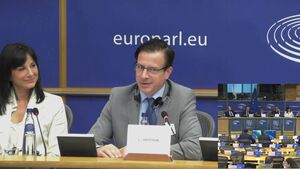Rural decline is an issue right across the EU

Western People columnist Dr Liam Heffron addressing the 'Depopulation Challenges in European Regions' public hearing at the Committee on Regional Development (REGI) of the European Parliament.
“We have not much time left!”
The Greek MEP was on her feet, waving her arms with the kind of fervour usually reserved for Eurovision voting scandals. She let loose a rapid-fire burst of Greek that, through the miracle of Brussels translation, emerged in my headphones as a breathless monotone.
"Or our far-right friends will capitalise on these communities as they are doing now, thank you, chairperson.”
And with that, like a laptop on a dodgy battery, she powered down and sat abruptly.
The committee chair, DragoÅ Benea, a poker-faced Romanian politician, barely looked up as he called the next speaker. Business as usual.
A Belgian MEP then began the obligatory one-minute statement - not so much addressed to us in the room, but clearly aimed at his local evening news or perhaps his Facebook followers back home. Then, mid-flow, he glanced up at the podium and caught me off guard as I was seated beside the chairman and my fellow ‘experts’, who at that moment were collectively using one pencil and two and a half sheets of paper to note the series of potential questions from grandstanding politicians
“My question is for Dr Heffron - why was there no public meeting to do something when the village infrastructure of Moy-Gow-Nagh closed?”
As per the strange etiquette of these EU hearings, I had a few minutes' grace before having to reply. Plenty of time to stage an internal debate with myself, which was repeatedly interrupted every few seconds by giddy potatoes jumping up and down on a sizzling medium-rare steak (to be fair I had skipped breakfast). How to explain how defeated the community feels?
Seated somewhere in this European maze was Ciaran Mullooly - one of the Parliament’s hardest-working new recruits. The former RTÉ reporter had been frozen out by Fianna Fáil and Fine Gael, so now he was making allies in Europe, resulting in Mullooly being elected to the Committee on Regional Development of the European Parliament (better known as REGI). It is here, at the beginning of the year, that the Midlands-based MEP quoted my article in a rousing speech on the lack of Irish government action on depopulation. This saw the committee chairman Benea invite myself and three other experts to the European Parliament in Brussels on March 9th to speak at a hearing on 'Depopulation Challenges in European Regions'.
On the surface, the REGI committee is a kind of syrupy bureaucracy, thick with votes and endless speeches. But under the treacle, there’s an urgency. Many of Europe’s regions are losing their productive populations. To address this complex issue, the Parliament is developing a coordinated European approach to examine how cohesion policy and other EU tools can help reverse population decline, focusing on regional development, infrastructure investment and job creation in order to make these areas more attractive for residents and businesses. Otherwise, it is leading to increased support for right-wing extremism from disaffected communities with growing disenchantment that the Greek MEP had flagged with such (brief) energy.
A theme began to emerge from many MEP’s speeches: national governments, they complained, were the bottleneck. EU money and support could save struggling regions - if only the member states didn’t block the pipes. No government likes to be told what to do with their regions by supra-national institutions - or anyone really.
On my far right was Isabel Blanco Llamas from Spain’s Castilla y León region. Affable, quick-talking, and very good at the political art of making demographic catastrophe sound like an opportunity, she called for permanent EU-backing for depopulated regions, exhibiting the kind of practiced urgency that indicated this was clearly not her first rodeo.
Beside me was Profesor Tiziana Laureti from Italy, sitting nervously before launching into detailed maps of Europe’s demographic black holes. Her statistics were sobering: places losing people lose their economic muscle, their creativity, their future. She mapped out vast swathes of eastern and southern Europe suffering in a critical situation. When I pointed out that rural Ireland was bleeding people too, her brow furrowed, Ireland looked fine.
“I just can’t see it,” she said.
That, I explained, was the magic gerrymandering trick pulled off by successive Irish governments: lump together Dublin’s roaring suburbs with the dying west in a vast Border, Midlands and West region to get more money from Brussels. The issue wasn’t her research but how the population losses of rural Ireland are subverted by the massive demographic growth in the growing eastern urbanisation. Never mind that any per-capita statistic, which relies on the fiction which is the Irish Gross Domestic Product, will always produce results as real as low-taxed leprechauns.
Then, via Zoom, came Professor Irena Baclija Brajnik from Slovenia, juggling a sick child at home but still managing to deliver the plain truth: you can't fix depopulation from Brussels or indeed Dublin alone. Demographic losses can only be reversed by tailor-made policies depending on the particular characteristics of the affected regions, coupled with genuine dialogue with local communities.
She emphasised the importance of local autonomy where local government units have an important role in the economy and political system, have discretion and independence in determining what they will do and have the means or capacity to do so. In her list of OECD countries, investigated for local autonomy over 2015-2020, Ireland ranked eighth from bottom, being the worst-ranked EU country aside from the democratic paradise that is Orban’s Hungary and five above Putin’s Russia.
All of this dovetailed with my own case study on North Mayo. I painted a blunt picture: local democracy in rural Ireland is “completely on the floor” (according to senior Fianna Fáil councillor in Mayo, Damian Ryan). Mayo County Council itself isn’t fit for purpose and communities are being stripped of their native youth, culture and solidarity, being left emasculated, frustrated and vulnerable - unfit to welcome new arrivals while ripe for the kind of political exploitation posed by certain reality TV stars and former UFC fighters. I even scored a round of applause (though, to be fair, that's an old actor's trick which I am not divulging).
When my turn came to answer the Belgian inquisitor, I managed to quieten the dancing spuds in my head and suggested: “Rather than speculate on why there was no local meeting, I’d offer that if you had a democratically elected local council, funded and empowered to act - and veto - on matters affecting its own future, you’d not only get a response, you’d have had a plan in place before the crisis ever hit.”
I tossed in the example of Ballina’s now-abolished urban council, which in the hungry 1930s had pulled off one of the state's biggest housing developments - a unique feat in today’s terms also. That got a few raised eyebrows and nods of heads.
One MEP bristled at my mention of local veto power for communities.
“What if they said no to immigration?”
I didn’t blink.
“If you respect democracy, then communities must be able to say no, as well as yes. But I believe most people are, in their hearts, good and kind. Given real empowerment, they’ll welcome newcomers and then take ownership of it - unlike now, where faceless bureaucrats enforce diktats onto powerless communities which breeds resentments - with the result as expressed by your Greek colleague of extremist demagogues harnessing their support."
That seemed to land. Later, a formal thank-you arrived from the REGI committee, praising my “insights on the demographic evolution of Moygownagh, and the lessons learnt about the importance of preserving local cultural traditions and heritage, and the importance of promoting participatory local democracy to enable local communities to build their own future were both enlightening and impactful".
But honestly? Aside from the steak and fries that Ciaran Mullooly bought me, I was both proud and glad in the small satisfaction of putting Mayo’s communities on the map - if only for a day - in the EU’s’ labyrinth of gleaming corridors, endless votes and grandstanding speeches.
Is it enough? Clearly not. But with the likes of Ciaran Mullooly doing his best in Brussels and with like-minded politicians and officials, we may have a chance because there seems to be next-to-nothing being done in Dublin about it.





